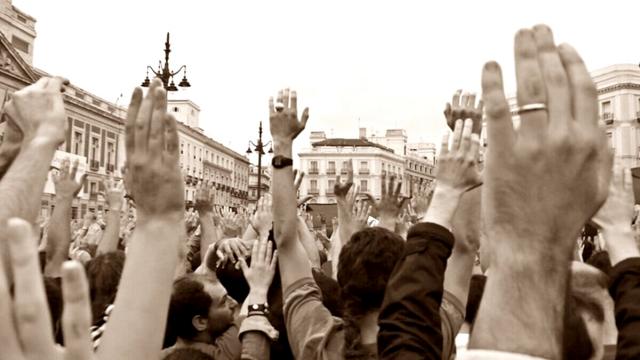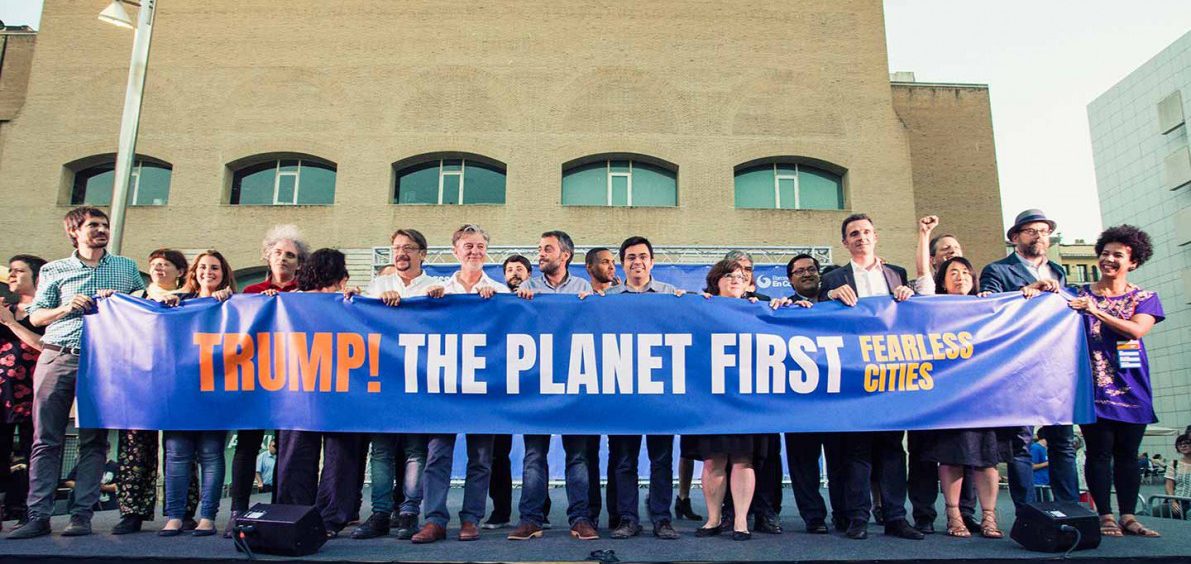
This is Part 8 in a series about Radical Municipalism, looking at ways people worldwide are organizing in their cities to build power from the bottom up. Read Part 1 (Brazil) Part 2 (Rojava), Part 3 (Chiapas), Part 4 (Warsaw), Part 5 (Bologna), Part 6 (Jackson), Part 7 (Athens) and Part 8 (Warsaw & New York), Part 9 (Reykjavík), and Part 10 (Argentina).
“There's a critical mass of municipalist thought and sympathy in several areas in the U.S.," explained Eleanor Finley, an anthropologist and activist. "You can think of there being four corners of a small but rapidly growing municipalist movement: the Pacific Northwest (Portland, Olympia, Seattle); the Northeast (New York City, Massachusetts); the South (Jackson, Miss., Atlanta, South Carolina); and the Midwest (Chicago, Milwaukee, Detroit).”
She continued: “With the exception of Cooperation Jackson, the municipalist and civic platform projects at each of these locations are in early stages of development.”
Finley works with Symbiosis, a network of "activists, organisers and dreamers" who, alongside Cooperation Jackson and other U.S. municipalists, are co-organising the Fearless Cities gathering in New York on July 27.
Barcelona hosted the first Fearless Cities convergence last year after a wave of participative citizen platforms reclaimed cities across the Spanish state in 2015. Fearless Cities One brought together muncipalists from every continent to skill-share on themes including feminizing politics, refugee rights and anti-corruption.
The global municipalist movement is growing to solve endemic problems, as this series is showcasing. Cities are filling the gaps left by nation-states, which often themselves exasperate the crises. In 2018, there will be Fearless Cities in Warsaw and New York, with parallel events planned in Chile and Belgium.
New York, July 27-29
New York is ideal for the United States' first Fearless Cities, according to Finley. "Firstly, it's important to remember the singular place New York City holds in the U.S. left, both historically and in the present. At a very pragmatic level, NYC is likely the only city with a left with the capacity for such a project. Also, assembly democracy and direct civic participation is palatable there because Occupy Wall Street still holds a strong place in people's imaginations."
Convergence themes include transforming power, participatory democracy, queering and feminizing politics and contemporary municipal issues. It will feature the solidarity economy in Jackson, explored in Part 6 of this series. And its theme of feminising politics is something you can also see from Brazil (Part 1) to Rojava (Part 2) to the Zapatistas (Part 3).
If radical municipalism is about locally created solutions to global problems, Fearless Cities demonstrates how muncipalism is more of a philosophical way of doing politics, rather than a blueprint to be be applied.
Fearless Cities, Warsaw, July 13-15
The organisers of the convergence in Poland's capital, Warsaw, explained about the central and eastern European context: "Our cities are much different because of the transformation from central planning to the free market society. We have special challenges, different aspirations yet similar solutions."
The workshops and teach-outs in Warsaw include: "The common denominator of Central and Eastern Europe"; "How sports can challenge hate"; and a walking tour showcasing how the municipalist activist group Miasto Jest Nasze is dealing with Warsaw's acute housing problem. Miasto Jest Nasze, which serves as the convergence organisers, is also taking on the city's acute smog problem. This conference will also look east, to municipal projects in Ukraine, Russia, Belarus and Georgia.
The way that rebel cities are networking answers a critique of radical municipalism, namely: how can cities solve global problems? In practical terms, refugee solidarity shows their collective power.
Challenging States: Making Refugees Welcome
The rise of far-right anti-immigrant politics has taken hold across Europe as well as the U.S. in the last five years. It is resisted, however, with the message "Refugees Welcome". The radical municipalist mayor of Barcelona, Ada Colua, brought this movement to wider public attention through a viral video.
Afterwards, rebel cities across Europe galvanised to become sanctuary cities, offering accomidation for refugees. City halls hung massive refugees welcome banners. Today, this continues as Barcelona offers safe habour to migrants who survived crossing the Mediterranean.
"Seeing the failure of the Spanish state, we wanted to open our cities [as] people's houses. Town hall's message was clear: The Spanish state is not providing enough support," said David Castro, who participates in the international working group of Barcelona En Comu, the citizens platform that runs the city.
It's About Taking Back Your City
Castro said that before, there was little mainstream discourse challenging the state-led policies that demonised and detained migrants, sometimes causing their deaths. European states (and the U.S. included) have continued with these kinds of policies against migrants. The crucial question is how much worse would it be for migrants if not for the political resistance and courage shown by some.
The international working group of Barcelona En Comu organised the first Fearless Cities. It offers help and support to municipalist projects across the globe, including at both the convergences in Warsaw and New York. In fact, there are many municipalists networking internationally. This enabled the 2015 municipalist wave across the Spanish state, building on a network that had created and grown out of the 2011 protests of the square.
"It was not a formal partnership, instead a lot of information sharing, as everyone had different ecosytems, with their own unique problems," added Castro. "For instance, in Zaragoza they have a big problem with corruption. Three or four families own the city, so their campaign was more anti-corruption [than Barcelona]."
Looking at the growing, global municipalist movement, it's useful to think of it as a network movement: Every city is looking to build autonomy locally, but they are thinking globally.
This has historic precendents in the Ancient Greek city-states and confederations of Indigenous northeast American nations before colonisation. The most developed autonomous city networks today are in the Democratic Confederation of Northern Syria and the Zapatistas' Chiapas. In the U.S., Jackson shows a city moving towards an economic model that aims to not be a centralised source of power (ie. capitalism) but as a hub to enable other decentralised cooperative forces.
Looking back to New York, Finley said that Fearless Cities in the US connects especially to an American politics in flux. "The polarization of society is now growing into two completely separate trajectories of development," she said.
"On the one hand, there's a branch devolving rapidly into fascism, which is concentrated primarily within decaying suburban zones and neglected rural areas. Then there's a [radically democratic] branch that is becoming very radical, very quickly."
Read Part 1 (Brazil) Part 2 (Rojava), Part 3 (Chiapas), Part 4 (Warsaw), Part 5 (Bologna), Part 6 (Jackson), Part 7 (Athens) and Part 8 (Warsaw & New York), Part 9 (Reykjavík), and Part 10 (Argentina).
















